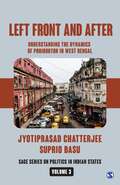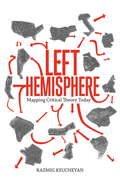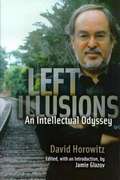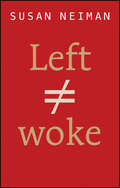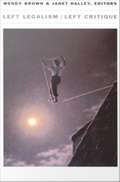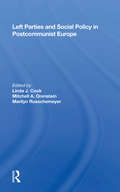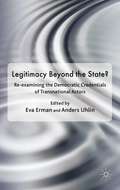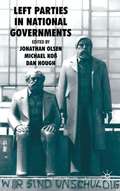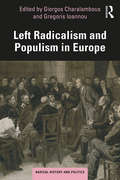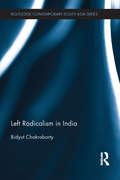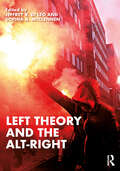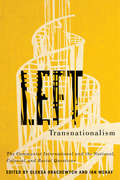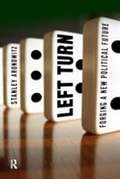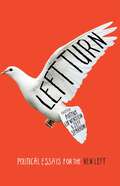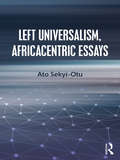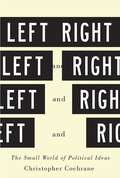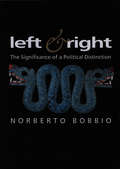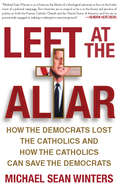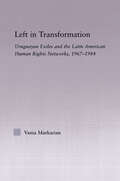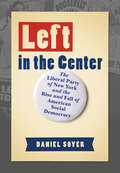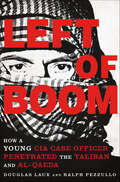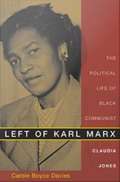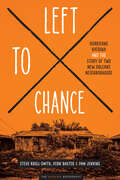- Table View
- List View
Left Elsewhere: Finding the Future in Radical Rural America (Boston Review)
by Elizabeth CatteAn examination of the emerging rural left, from environmentalists blocking pipeline construction to teachers on strike. In Left Elsewhere, volume editor and lead essayist Elizabeth Catte turns a skeptical eye toward “purple” politicians, such as West Virginia Democrat Richard Ojeda, who are hailed by many as the best hope for U.S. progressives outside the urban coasts. By offering a survey of what the left actually looks like outside major urban centers, Catte shows how an emerging rural left is developing new strategies that do not easily fit into typical ideas of liberals, leftists, and Democratic politics. From environmentalists who successfully block pipeline construction to advocates for “radical” health care solutions such as needle exchanges to school teachers who go on strike, these newly energized activists may offer a better path forward for both policy and candidates to represent the needs of poor and working Americans. By engaging activists and scholars outside the coastal bubbles, this collection offers insights into several overlooked areas, including working-class women's activism, victories in new labor struggle (especially in staunchly right-to-work states) and new organizing principles in Jackson, Mississippi—"America's most radical city"—that are bringing about meaningful racial and economic change on the ground. Taken together, the essays in Left Elsewhere show that today's political language is insufficient to convey what's happening in these areas and examine what, if any, coherent set of politics can be assigned to them. Contributors William J. Barber II, Thomas Baxter, Lesly-Marie Buer, Ash-Lee Woodard Henderson, Nancy Isenberg, Elaine C. Kamarck, Michael Kazin, Toussaint Losier, Robin McDowell, Bob Moser, Hugh Ryan, Matt Stoller, Ruy Teixeira, Makani Themba, Jessica Wilkerson
Left Front and After: Understanding the Dynamics of Poriborton in West Bengal (SAGE Series on Politics in Indian States)
by Jyotiprasad Chatterjee Suprio BasuThe politics of West Bengal was long known for the uninterrupted rule of the Left Front from 1977 to 2011. For a long period, the politics of the state was marked by overt absence of caste-, religion- and ethnicity-based contestations and this made West Bengal an exceptional case. Adopting a historical and comparative approach, the book traces the changing nature of politics of West Bengal since the late 1990s. It documents how economic and social degeneration in the state led to increasing caste and identity assertions and left-wing extremist politics. It chronicles the history of the social movements at Singur and Nandigram that ultimately challenged the Left hegemony and initiated the much talked-about poriborton (change) in West Bengal politics. With the help of the unique data sets of National Election Studies, the book closely analyses the shifting nature of state-level political dynamics under the rule of the All India Trinamool Congress (AITC) in the context of broader socio-economic changes. The book presents emerging party competition in the state marked by the eclipse of both the Left and the Congress and the arrival of the BJP.
Left Hemisphere
by Gregory Elliott Razmig KeucheyanAs the crisis of capitalism unfolds, the need for alternatives is felt ever more intensely. The struggle between radical movements and the forces of reaction will be merciless. A crucial battlefield, where the outcome of the crisis will in part be decided, is that of theory. Over the last twenty-five years, radical intellectuals across the world have produced important and innovative ideas. The endeavour to transform the world without falling into the catastrophic traps of the past has been a common element uniting these new approaches. This book - aimed at both the general reader and the specialist - offers the first global cartography of the expanding intellectual field of critical contemporary thought. More than thirty authors and intellectual currents of every continent are presented in a clear and succinct manner. A history of critical thought in the twentieth and twenty-first centuries is also provided, helping situate current thinkers in a broader historical and sociological perspective.From the Hardcover edition.
Left Illusions
by David HorowitzDavid Horowitz is one of the founding intelectuals of the American left. In the 1960's he was at the "intellectual center of the New Left" but by the 1980s he had broken with the left and become one of its most viggerous and thought provoking opponents. This book is a collection of Mr. Horowitz's writings from the mid 60's to the present showing his development from a young radical of the left to a man who completely a poses everything the left stands for. He argues that the Left Illusions have caused more death and human misery then anything else in human history. After two century's and over a hundred million deaths its time to turn away from Marks and and abandon the eutopien nightmare. Born in a communist aunclave in New York, He discribes how he changed from a "Red Diaper Baby" to a conservative. Mr. Horowitz writes "I realized that you couldn't sit everybody down and re-educate them, make them good parents and good citizens. This meant that you couldn't really remake the world as the left intended without totalitarian coercion. But it was much more difficult to accept the consequences of that realization. For a long time, I simply could not face the possibility that there was no socialist future, that I was not going to be a social redeemer, and that we didn't have the answers to humanity's problems-in short, that I wasn't part of an historic movement that would change the world." After turning away from the left, He could look back at the left and see the terrible havock which has been wrought and is still being wrought The eutopien dreams which in practice leed to the Goolag and the Iron Curtain.David Horowitz is one of the founding intellectuals of the American left. In the 1960s he was at the "intellectual center of the New Left" but by the 1980s he had broken with the left and become one of its most vigorous and thought-provoking opponents. This book is a collection of Mr. Horowitz's writings from the mid-60's to the present, showing his development from a young radical of the left to a man who completely opposes everything the left stands for. He argues that the “Left Illusions” have caused more death and human misery than anything else in human history. After two centuries and over a hundred million deaths, it’s time to turn away from Marx and abandon the utopian nightmare. Born in a communist enclave in New York, he describes how he changed from a "Red Diaper Baby" to a conservative. Mr. Horowitz writes, "I realized that you couldn't sit everybody down and re-educate them, make them good parents and good citizens. This meant that you couldn't really remake the world as the left intended without totalitarian coercion. But it was much more difficult to accept the consequences of that realization. For a long time, I simply could not face the possibility that there was no socialist future, that I was not going to be a social redeemer, and that we didn't have the answers to humanity's problems--in short, that I wasn't part of an historic movement that would change the world." After turning away from the left, he could look back at the left and see the terrible havoc which has been wrought and is still being wrought: the utopian dreams which in practice led to the Gulag and the Iron Curtain.
Left Is Not Woke
by Susan NeimanIf you’re woke, you’re left. If you’re left, you’re woke. We blur the terms, assuming that if you’re one you must be the other. That, Susan Neiman argues, is a dangerous mistake. The confusion arises because woke is fuelled by traditionally leftwing emotions: the wish to stand with the oppressed and marginalized, to address historic crimes. But those emotions are undermined by widespread philosophical assumptions with reactionary sources. As a result, wokeism conflicts with ideas that have guided the left for more than 200 years: a commitment to universalism, a firm distinction between justice and power, and a belief in the possibility of progress. Without these ideas, the woke will continue to undermine their own goals and drift, inexorably and unintentionally, towards the right.One of the world’s leading philosophical voices, Neiman calls with passion and power for the left to return to the ideals that built the best of the modern world.
Left Legalism / Left Critique
by Wendy Brown Janet HalleyIn recent decades, left political projects in the United States have taken a strong legalistic turn. From affirmative action to protection against sexual harassment, from indigenous peoples' rights to gay marriage, the struggle to eliminate subordination or exclusion and to achieve substantive equality has been waged through courts and legislation. At the same time, critiques of legalism have generally come to be regarded by liberal and left reformers as politically irrelevant at best, politically disunifying and disorienting at worst. This conjunction of a turn toward left legalism with a turn away from critique has hardened an intellectually defensive, brittle, and unreflective left sensibility at a moment when precisely the opposite is needed. Certainly, the left can engage strategically with the law, but if it does not also track the effects of this engagement--effects that often exceed or even redound against its explicit aims--it will unwittingly foster political institutions and doctrines strikingly at odds with its own values. Brown and Halley have assembled essays from diverse contributors--law professors, philosophers, political theorists, and literary critics--united chiefly by their willingness to think critically from the left about left legal projects. The essays themselves vary by topic, by theoretical approach, and by conclusion. While some contributors attempt to rework particular left legal projects, others insist upon abandoning or replacing those projects. Still others leave open the question of what is to be done as they devote their critical attention to understanding what we are doing. Above all, Left Legalism/Left Critique is a rare contemporary argument and model for the intellectually exhilarating and politically enriching dimensions of left critique--dimensions that persist even, and perhaps especially, when critique is unsure of the intellectual and political possibilities it may produce. Contributors: Lauren Berlant, Wendy Brown, Judith Butler, Drucilla Cornell, Richard T. Ford, Katherine M. Franke, Janet Halley, Mark Kelman, David Kennedy, Duncan Kennedy, Gillian Lester, Michael Warner
Left Parties And Social Policy In Postcommunist Europe
by Linda J CookThis book attempts to explain why, and to evaluate what the return of the left has meant for the social policy of the states they have helped govern. It focuses on the East-Central European countries of Poland, Hungary, and the Czech Republic, significantly Russia.
Left Parties in National Governments
by Eva Erman Anders UhlinCombining case studies with normative theory, this book analyzes the democratic credentials of transnational actors participating in global governance, ranging from corporations and philanthropic foundations to NGOs and social movements. This leads to innovative interpretations of democratic legitimacy in a transnational context.
Left Parties in National Governments
by Jonathan Olsen Michael Koß Dan HoughAnalyzes why Left Parties enter national government, what they do when they get there and what effect this has on them. Alongside two comparative chapters, this book features detailed case-studies of European Left Parties in government.
Left Radicalism and Populism in Europe (Routledge Studies in Radical History and Politics)
by Giorgos Charalambous Gregoris IoannouWhile there has been much focus in recent times on the rise of right-wing populism in Europe, there has been surprisingly little material on the phenomenon of left-wing populism. This edited collection seeks to fill that gap with an investigation of the relationship between the radical left and populism. Featuring a broad range of historical and contemporary case studies from across Europe, this is a much-needed empirical account of this phenomenon. This book will be of considerable interest to researchers, scholars and students of left radicalism, European politics and the politics of social movements. It will also appeal to appeal to non-academic audiences, especially party and social movement activists because of its politically salient topic and its historical and comparative focus.
Left Radicalism in India (Routledge Studies in South Asian Politics)
by Bidyut ChakrabartyLeft radicalism in India was rooted in the nationalist movement and was set in motion in the 1920s with the formation of the communist party. The communist movement manifested itself differently in each phase of India’s political history and Communism continues to remain a meaningful alternative ideological discourse in India. This book examines left politics in India focusing on its rise, consolidation and relative decline in the present century. Left radicalism in India is a distinct ideological phenomenon which is articulated in two complementary ways: while the parliamentary left remains social democratic in character, its bête noire, the left wing extremists, continue to uphold the classical Marxist, Leninist and Maoist notion of violent revolution. By concentrating on the nature and also activities of these two versions of left radicalism, this book is a thorough study of the phenomenon. The author analyses the states of Kerala, West Bengal and Tripura and presents a variety of case studies of communist movements. He argues that the political power of the left parties depends on the degree to which they have built organizational strength, political hegemony and a broad social base through legal and extra-parliamentary struggles. An in-depth study of socio-economic circumstances that remain critical in conceptualizing radical extremism, Left Radicalism in India will be of interest to those studying Indian Politics, South Asian History, Development Studies and Global Politics.
Left Theory and the Alt-Right
by Sophia A. McClennen Di Leo, Jeffrey R.The alt-right movement in the United States has actively been endorsing the use of left theory to achieve its ends—and with varying degrees of success. Tracing occasions where figures on the alt-right reference left theory, this volume asks if the alt-right’s reference of left theory is just bad reading, or are there troubling ways that certain types of left theory encourage such interpretations? What if the connections between left theory and the alt-right lie in the shared disdain for certain types of institutions, structures of power, and the status quo? Are there lessons to be learned in what can often appear as an overlapping desire to deconstruct concepts like truth, justice, freedom, and democracy? Drawing on the longer history of right-wing readings of left theory, this volume seeks to unpack these recent developments and consider their impact on the future of theory.
Left Transnationalism: The Communist International and the National, Colonial, and Racial Questions (Rethinking Canada in the World #4)
by Ian McKay Oleksa DrachewychIn 1919, Bolshevik Russia and its followers formed the Communist International, also known as the Comintern, to oversee the global communist movement. From the very beginning, the Comintern committed itself to ending world imperialism, supporting colonial liberation, and promoting racial equality. Coinciding with the centenary of the Comintern's founding, Left Transnationalism highlights the different approaches interwar communists took in responding to these issues. Bringing together leading and emerging scholars on the Communist International, individual communist parties, and national and colonial questions, this collection moves beyond the hyperpoliticized scholarship of the Cold War era and re-energizes the field. Contributors focus on transnational diasporic and cultural networks, comparative studies of key debates on race and anti-colonialism, the internationalizing impulse of the movement, and the evolution of communist platforms through transnational exchange. Essays further emphasize the involvement of communist and socialist parties across Canada, Australia, India, China, Japan, Southeast Asia, Latin America, South Africa, and Europe. Highlighting the active discussions on nationality, race, and imperialism that took place in Comintern circles, Left Transnationalism demonstrates that this organization - as well as communism in general - was, especially in the years before 1935, far more heterogeneous, creative, and unpredictable than the rubber stamp of the Soviet Union described in conventional historiography. Contributors include Michel Beaulieu (Lakehead University), Marc Becker (Truman State University), Anna Belogurova (Freie Universitat Berlin), Oleksa Drachewych (University of Guelph), Daria Dyakonova (Université de Montréal), Alastair Kocho-Williams (Clarkson University), Andrée Lévesque (McGill University), Lars T. Lih (Independent Scholar), Ian McKay (McMaster University), Sandra Pujals (University of Puerto Rico), John Riddell (Ontario Institute of Studies in Education), Evan Smith (Flinders University), S.A. Smith (All Souls College, Oxford), Xiaofei Tu (Appalachian State University), and Kankan Xie (Peking University).
Left Turn: Forging a New Political Future
by Stanley AronowitzBuilding a new platform for change, prominent social critic Stanley Aronowitz diagnoses America's crisis of democracy and the dangers of the new authoritarianism. Aronowitz draws on his vast knowledge of history and political theory and from currents of political change around the globe, from the traditions of the European left to the newest political trends in Latin America that have challenged the death of socialism. Demonstrating why Democrats lose when they cling to centrism and compromise their core values, this book shows us what a new left party in America would look like in an era of globalization, terrorism, and a crisis of public confidence in government. Listen to Stanley Aronowitz's December 12th, 2007 interview with Against the Grain here: http://www.againstthegrain.org/
Left Turn: Political Essays for the New Left
by Antony Loewenstein Jeff SparrowThe 2008 financial crisis opened the door for a bold, progressive social movement. But despite widespread revulsion at economic inequity and political opportunism, after the crash very little has changed.Has the Left failed? What agenda should progressives pursue? And what alternatives do they dare to imagine?Left Turn is aimed at the many Australians disillusioned with the political process. It includes passionate and challenging contributions by a diverse range of writers, thinkers and politicians, from Larissa Behrendt and Christos Tsiolkas to Guy Rundle and Lee Rhiannon. These essays offer perspectives largely excluded from the mainstream. They offer possibilities for resistance and for a renewed struggle for change.
Left Universalism, Africacentric Essays
by Ato Sekyi-OtuLeft Universalism, Africacentric Essays presents a defense of universalism as the foundation of moral and political arguments and commitments. Consisting of five intertwined essays, the book claims that centering such arguments and commitments on a particular place, in this instance the African world, is entirely compatible with that foundational universalism. Ato Sekyi-Otu thus proposes a less conventional mode of Africacentrism, one that rejects the usual hostility to universalism as an imperialist Eurocentric hoax. Sekyi-Otu argues that universalism is an inescapable presupposition of ethical judgment in general and critique in particular, and that it is especially indispensable for radical criticism of conditions of existence in postcolonial society and for vindicating visions of social regeneration. The constituent chapters of the book are exhibits of that argument and question some fashionable conceptual oppositions and value apartheids.This book will be of great interest to students and scholars in the fields of social and political philosophy, contemporary political theory, postcolonial studies, African philosophy and social thought.
Left and Right
by Christopher CochraneThe words "left" and "right" often signal a political divide in debates about topics as diverse as abortion, capital punishment, gun control, social welfare, taxation, immigration, and the environment. Despite claims that political polarization is in decline, its persistence suggests that it is inherent to our society. At the same time, variations in the perception of each side indicate that these labels do not fully capture the reality of ideological disagreement. In Left and Right, Christopher Cochrane traces the origins of this political language to the very nature of ideology. What is ideology, what does it look like, and how does it manifest itself in patterns of political disagreement in Western democracies? Drawing on five decades of evidence from political scientists, including public opinion surveys, elite surveys, and content analysis of political party election platforms, Cochrane employs a new method to analyze the structure and evolution of the left/right divide in twenty-one Western countries since 1945. He then delves into the central argument of the book - that the language of left and right describes a meaningful, perceptible, and quantifiable pattern of political disagreement that has persisted over time and around the world. Calling for an adjustment to the way we view Canadian politics, Left and Right opens a window into the world of political ideologies - a world we see every day, but rarely analyze, define, or agree on.
Left and Right: The Significance of a Political Distinction
by Norberto BobbioFollowing the collapse of communism and the decline of Marxism, some commentators have claimed that we have reached the 'end of history' and that the distinction between Left and Right can be forgotten. In this book - which was a tremendous success in Italy - Norberto Bobbio challenges these views, arguing that the fundamental political distinction between Left and Right, which has shaped the two centuries since the French Revolution, has continuing relevance today. Bobbio explores the grounds of this elusive distinction and argues that Left and Right are ultimately divided by different attitudes to equality. He carefully defines the nature of equality and inequality in relative rather than absolute terms. Left and Right is a timely and persuasively argued account of the basic parameters of political action and debate in the modern world - parameters which have remained constant despite the pace of social change. The book will be widely read and, as in Italy, it will have an impact far beyond the academic domain.
Left and Right: The Small World of Political Ideas (McGill-Queen's Studies in Urban Governance)
by Christopher CochraneHow left/right ideology has evolved in the postwar era and changed Canadian politics.
Left at the Altar: How the Democrats Lost the Catholics and How the Catholics Can Save the Democrats
by Micheal Sean WintersIn 1960, Democrats and Catholics united to elect John F. Kennedy, America's first Catholic president. As we approach the 2008 presidential election, the Democratic party is struggling to secure Catholic votes.<P><P> For most of the twentieth-century, however, the Catholic vote was solidly Democratic. In Left at the Altar, Michael Sean Winters chronicles the rise and fall of this vital alliance, and offers compelling arguments for its revival. For the Democrats, the stakes could not be higher: The explosive growth of the Latino population will make the Catholic vote decisive in the twenty-first century. The stakes are high for Catholics, too: In their defection to the Republican party, Catholics have drifted from their traditional advocacy of core values including peace and social justice.
Left in Transformation: Uruguayan Exiles and the Latin American Human Rights Network, 1967 -1984
by Vania MarkarianThis book takes an innovative look at international relations. Focusing on the worldwide campaign against abuses by the right-wing authoritarian regime in Uruguay (1973-1984), it explores how norms and ideas interact with political interests, both global and domestic. It examines joint actions by differently-motivated actors such as the leftist activists who had to flee Uruguay in these years, the Organization of American States, The United Nations, Amnesty International, and the United States. It traces language and procedures for making their claims. The chief goal, however, is to peruse the specific reasons that led these actors to endorse the central core of liberal rights that gave foundation to this system. A close examination of the available documents shows that even as they joined efforts to protest abuses, they were still pursuing their individual agendas, which is often overlooked in the existing scholarship on human rights transnational activism. The book pays special attention to the Uruguayan exiles, analyzing why and how leftist activists and leaders adopted the human rights language, which had so far been used to attack communism in the context of the Cold War.
Left in the Center: The Liberal Party of New York and the Rise and Fall of American Social Democracy
by Daniel SoyerDaniel Soyer's history of the Liberal Party of New York State, Left in the Center, shows the surprising relationship between Democratic Socialism and mainstream American politics.Beginning in 1944 and lasting until 2002, the Liberal Party offered voters an ideological seal of approval and played the role of strategic kingmaker in the electoral politics of New York State. The party helped elect presidents, governors, senators, and mayors, and its platform reflected its founders' social democratic principles. In practical politics, the Liberal Party's power resided in its capacity to steer votes to preferred Democrats or Republicans with a reasonable chance of victory. This uneasy balance between principle and pragmatism, which ultimately proved impossible to maintain, is at the heart of the dramatic political story presented in Left in the Center.The Liberal Party, the longest-lived of New York's small parties, began as a means for anti-Communist social democrats to have an impact on the politics and policy of New York City, Albany, and Washington, DC. It provided a political voice for labor activists, independent liberals, and pragmatic social democrats. Although the party devolved into what some saw as a cynical patronage machine, it remained a model for third-party power and for New York's influential Conservative and, later, the Working Families parties.With an active period ranging from the successful senatorial career of Jacob Javits to the mayoralties of John Lindsay and Rudy Giuliani, the Liberal Party effectively shaped the politics and policy of New York. The practical gains and political cost of that complicated trade-off is at the heart of Left in the Center.
Left of Boom: How a Young CIA Case Officer Penetrated the Taliban and Al-Qaeda
by Ralph Pezzullo Douglas LauxLeft of Boom is the explosive New York Times bestselling memoir by a young CIA operative on the front lines in Afghanistan.On September 11, 2001, Douglas Laux was a freshman in college, on the path to becoming a doctor. But with the fall of the Twin Towers came a turning point in his life. After graduating he joined the Central Intelligence Agency, determined to get himself to Afghanistan and into the center of the action. Through persistence and hard work he was fast-tracked to a clandestine operations position overseas. Dropped into a remote region of Afghanistan, he received his baptism by fire. Frustrated by bureaucratic red tape, a widespread lack of knowledge of the local customs and culture and an attitude of complacency that hindered his ability to combat the local Taliban, Doug confounded his peers by dressing like a native and mastering the local dialect, making contact and building sources within several deadly terrorist networks. His new approach resulted in unprecedented successes, including uncovering the largest IED network in the world, responsible for killing hundreds of US soldiers. Meanwhile, Doug had to keep up false pretenses with his family, girlfriend and friends--nobody could know what he did for a living--and deal with the emotional turbulence of constantly living a lie. His double life was building to an explosive resolution, with repercussions that would have far reaching consequences.
Left of Karl Marx: The Political Life of Black Communist Claudia Jones
by Carole Boyce DaviesIn Left of Karl Marx, Carole Boyce Davies assesses the activism, writing, and legacy of Claudia Jones (1915-1964), a pioneering Afro-Caribbean radical intellectual, dedicated communist, and feminist. Jones is buried in London's Highgate Cemetery, to the left of Karl Marx--a location that Boyce Davies finds fitting given how Jones expanded Marxism-Leninism to incorporate gender and race in her political critique and activism. Claudia Cumberbatch Jones was born in Trinidad. In 1924, she moved to New York, where she lived for the next thirty years. She was active in the Communist Party from her early twenties onward. A talented writer and speaker, she traveled throughout the United States lecturing and organizing. In the early 1950s, she wrote a well-known column, "Half the World," for the Daily Worker. As the U. S. government intensified its efforts to prosecute communists, Jones was arrested several times. She served nearly a year in a U. S. prison before being deported and given asylum by Great Britain in 1955. There she founded The West Indian Gazette and Afro-Asian Caribbean News and the Caribbean Carnival, an annual London festival that continues today as the Notting Hill Carnival. Boyce Davies examines Jones's thought and journalism, her political and community organizing, and poetry that the activist wrote while she was imprisoned. Looking at the contents of the FBI file on Jones, Boyce Davies contrasts Jones's own narration of her life with the federal government's. Left of Karl Marx establishes Jones as a significant figure within Caribbean intellectual traditions, black U. S. feminism, and the history of communism.
Left to Chance: Hurricane Katrina and the Story of Two New Orleans Neighborhoods (The Katrina)
by Steve Kroll-Smith Vern BaxterThis in-depth study of two black neighborhoods in the wake of Hurricane Katrina vividly captures the struggle and uncertainty in the process of rebuilding. Hurricane Katrina was the worst urban flood in American history, a disaster that destroyed nearly the entire physical landscape of a city, as well as the mental and emotional maps that people use to navigate their everyday lives. Left to Chance takes us into two African American neighborhoods—working-class Hollygrove and middle-class Pontchartrain Park—to learn how their residents have experienced &“Miss Katrina&” and the long road back to normal life. The authors spent several years gathering firsthand accounts of the flooding, the rushed evacuations that turned into weeks- and months-long exile, and the often confusing and exhausting process of rebuilding damaged homes in a city whose local government had all but failed. As the residents&’ stories make vividly clear, government and social science concepts such as &“disaster management,&” &“restoring normality,&” and &“recovery&” have little meaning for people whose worlds were washed away in the flood. For the neighbors in Hollygrove and Pontchartrain Park, life in the aftermath of Katrina has been a passage from all that was familiar and routine to an ominous world filled with existential uncertainty. Recovery and rebuilding become processes imbued with mysteries, accidental encounters, and hasty adaptations, while victories and defeats are left to chance.

